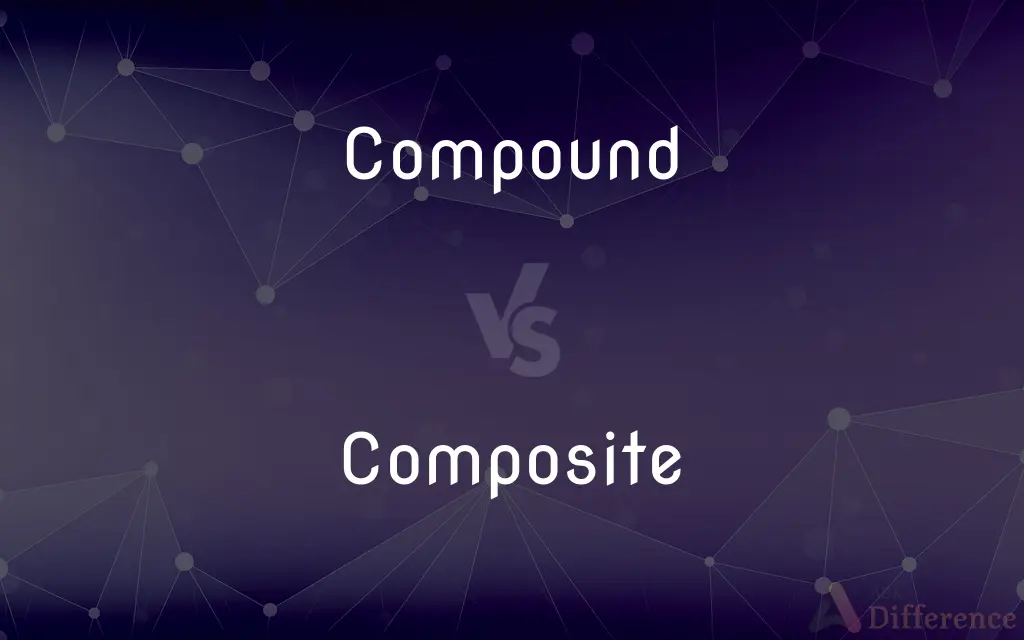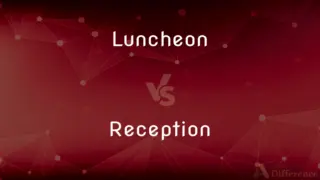Compound vs. Composite — What's the Difference?
By Maham Liaqat & Urooj Arif — Updated on March 7, 2024
Compounds form through chemical reactions bonding elements, while composites combine materials without bonding them chemically.

Difference Between Compound and Composite
Table of Contents
ADVERTISEMENT
Key Differences
A compound is a substance formed when two or more chemical elements are chemically bonded together, resulting in a substance with unique properties distinct from its constituent elements. Whereas, a composite is made by physically combining two or more different materials to enhance their properties, without any chemical bonding between them.
In compounds, the ratio of the elements involved is fixed and defined by chemical formulas, which dictate the composition of the compound. This fixed ratio ensures uniformity in the properties of the compound throughout. On the other hand, composites can have variable ratios of their constituent materials, allowing for a wide range of material properties tailored to specific applications. The flexibility in composition makes composites adaptable for various uses, from aerospace to construction.
The properties of a compound are entirely different from those of its constituent elements, as new chemical structures are formed during the compound's creation. For example, sodium is a highly reactive metal, and chlorine is a poisonous gas, but when combined, they form sodium chloride (table salt), which is safe for consumption. In contrast, composites retain the individual properties of their components while also displaying new characteristics arising from their combination. The strength and flexibility of fiberglass, for instance, result from the combination of brittle glass fibers and a strong resin matrix.
Compounds are subject to the laws of chemistry, including the conservation of mass and definite proportions. These principles govern the reactions and outcomes of compound formation, ensuring predictability and consistency in their behavior. Composites, however, are governed by principles of materials science and engineering, focusing on the physical mixture and the mechanical bonding of materials to achieve desired properties.
The study and application of compounds are central to chemistry and various scientific fields, as understanding the behavior of compounds is crucial for everything from pharmaceuticals to materials science. Composites, by their nature, are interdisciplinary, drawing from chemistry, physics, and engineering to innovate in fields like aerospace, automotive, and construction, where advanced materials with tailored properties are essential.
ADVERTISEMENT
Comparison Chart
Definition
A substance formed by the chemical bonding of two or more elements.
A material made by physically combining two or more different substances.
Bonding
Chemical bonds between elements.
No chemical bonding between components.
Properties
Distinct from constituent elements.
Retains properties of constituents; gains new properties from combination.
Composition Ratio
Fixed and defined by chemical formulas.
Variable, tailored for specific applications.
Application Fields
Chemistry, pharmaceuticals, materials science.
Aerospace, automotive, construction, materials engineering.
Compare with Definitions
Compound
A substance with a fixed chemical formula.
Water (H2O) is a compound made from hydrogen and oxygen.
Composite
A material combining two or more distinct substances.
Concrete is a composite made from cement, water, sand, and gravel.
Compound
Follows the laws of definite proportions and conservation of mass.
In every water molecule, the ratio of hydrogen to oxygen atoms is always 2:1.
Composite
Maintains the properties of individual components.
In fiberglass, the glass fibers contribute to strength while the resin provides flexibility.
Compound
Results from a chemical reaction between elements.
The formation of salt (NaCl) from sodium and chlorine is an example of compound creation.
Composite
The ratio of components can be adjusted for specific needs.
The proportion of resin to fiber in composites can be varied for desired toughness or elasticity.
Compound
Has properties distinct from its constituent elements.
Sodium chloride is neither metallic like sodium nor gaseous like chlorine.
Composite
Designed to enhance or combine property advantages.
Carbon fiber composites are known for their strength-to-weight ratio.
Compound
Central to the study of chemistry and various scientific applications.
Understanding the properties of carbon dioxide is crucial for studying atmospheric chemistry.
Composite
Used extensively in engineering and technological applications.
Composite materials are pivotal in the design of modern aircraft for their durability and lightweight.
Compound
To combine so as to form a whole; mix
Tin was often compounded with lead to make pewter.
Composite
Made up of several parts or elements
This soup is one of those composite dishes which you gradually build up
Compound
To produce or create by combining two or more ingredients or parts; compose or make up
Pharmacists compounding prescriptions.
Composite
Relating to or denoting a classical order of architecture consisting of elements of the Ionic and Corinthian orders.
Compound
To settle (a debt, for example) by agreeing on an amount less than the claim; adjust.
Composite
Relating to or denoting plants of the daisy family (Compositae ).
Compound
To compute (interest) on the principal and accrued interest.
Composite
A thing made up of several parts or elements
The English legal system is a composite of legislation and judicial precedent
Compound
To add to or intensify so as to make worse
"The university authorities ... compounded their crime in dismissing [the professor] by denying that their action ... reflected any abridgment of academic freedom" (John Kenneth Galbraith).
Composite
A plant of the daisy family (Compositae ).
Compound
To make worse by being an additional or intensifying factor
High winds compounded the difficulties of the firefighters.
Composite
The Composite order of architecture.
Compound
To combine in or form a compound.
Composite
Combine (two or more images) to make a single picture
Photographic compositing by computer
Compound
To come to terms; agree.
Composite
Made up of distinct components; compound.
Compound
Consisting of two or more substances, ingredients, elements, or parts.
Composite
Made by combining two or more existing things, such as photographs.
Compound
(Botany) Composed of more than one part
A compound pistil.
Composite
(Mathematics) Having factors; factorable.
Compound
A combination of two or more elements or parts.
Composite
(Botany) Of, belonging to, or characteristic of the composite family.
Compound
(Linguistics) A word that consists either of two or more elements that are independent words, such as loudspeaker, self-portrait, or high school, or of specially modified combining forms of words, such as Greek philosophia, from philo-, "loving," and sophia, "wisdom."
Composite
Composite(Architecture) Of, relating to, or being in the Composite order.
Compound
(Chemistry) A pure, macroscopically homogeneous substance consisting of atoms or ions of two or more different elements in definite proportions that cannot be separated by physical means. A compound usually has properties unlike those of its constituent elements.
Composite
A structure or entity made up of distinct components
A musical suite that is a composite of operatic themes.
Compound
A building or buildings, especially a residence or group of residences, set off and enclosed by a barrier.
Composite
A material in which two or more distinct, structurally complementary materials, usually a matrix material and a reinforcing material, are combined to produce structural or functional properties not present in any individual component. Wood, bone, concrete, plastic reinforced by glass fibers, and graphite reinforced with carbon fibers are all composite materials.
Compound
An enclosed area used for confining prisoners of war.
Composite
(Botany) A plant in the composite family.
Compound
An enclosure within which workers, prisoners, or soldiers are confined.
Composite
(Mathematics) The application of one function to another. For example, if (x) = x2 and g(x) = x + 1, then the composite (g(x)) = (x + 1)2 and the composite g((x)) = x2 + 1.
Compound
An enclosure for secure storage.
Composite
To make using distinct components.
Compound
A group of buildings situated close together, e.g. for a school or block of offices.
Composite
To make by combining two or more photographs or images.
Compound
Anything made by combining several things.
Composite
Made up of multiple components; compound or complex.
Compound
(chemistry) A substance formed by chemical bonding of two or more elements in definite proportions by weight.
Composite
(architecture) Being a mixture of Ionic and Corinthian styles.
Compound
A substance made from any combination of ingredients.
Composite
(mathematics) Having factors other than itself and one; not prime and not one.
Compound
(linguistics) A lexeme that consists of more than one stem.
Composite
(botany) Belonging to the Asteraceae family (formerly known as Compositae), bearing involucrate heads of many small florets.
Compound
(linguistics) A lexeme that consists of more than one stem or an affix, e.g. bookshop, high school or non-standard.
Composite
Employing multiple exposures on a single plate, so as to create an average view of something, such as faces in physiognomy.
Composite portraiture; a composite photograph
Compound
(rail) A compound locomotive, a steam locomotive with both high-pressure and low-pressure cylinders.
Composite
A mixture of different components.
Compound
Composed of elements; not simple.
A compound word
Composite
A structural material that gains its strength from a combination of complementary materials.
Compound
(math) Dealing with numbers of various denominations of quantity, or with processes more complex than the simple process.
Compound addition
Compound proportion
Composite
(botany) A plant belonging to the family Asteraceae, syn. Compositae.
Compound
(music) An octave higher than originally (i.e. a compound major second is equivalent to a major ninth).
Composite
(mathematics) A function of a function.
Compound
(transitive) To form (a resulting mixture) by combining different elements, ingredients, or parts; to mingle with something else.
To compound a medicine
Composite
(mathematics) composite number
Compound
To settle by agreeing on less than the claim, or on different terms than those stipulated.
To compound a debt
Composite
A drawing, photograph, etc. that combines several separate pictures or images.
Compound
(transitive) To settle amicably; to adjust by agreement.
Composite
A railway carriage with compartments for two different classes of travel; see Composite Corridor.
Compound
(intransitive) To come to terms of agreement; to settle by a compromise.
To compound with someone / for something
Composite
To make a composite.
I composited an image using computer software.
Compound
To compose; to constitute.
Composite
Made up of distinct parts or elements; compounded; as, a composite language.
Happiness, like air and water . . . is composite.
Compound
To increase in value with interest, where the interest is earned on both the principal sum and prior earned interest.
Composite
Belonging to a certain order which is composed of the Ionic order grafted upon the Corinthian. It is called also the Roman or the Italic order, and is one of the five orders recognized by the Italian writers of the sixteenth century. See Capital.
Compound
To worsen a situation.
Composite
Belonging to the order Compositæ; bearing involucrate heads of many small florets, as the daisy, thistle, and dandelion.
Compound
Of a horse: to fail to maintain speed.
Composite
That which is made up of parts or compounded of several elements; composition; combination; compound.
Compound
In the East Indies, an inclosure containing a house, outbuildings, etc.
Composite
A conceptual whole made up of complicated and related parts;
The complex of shopping malls, houses, and roads created a new town
Compound
That which is compounded or formed by the union or mixture of elements ingredients, or parts; a combination of simples; a compound word; the result of composition.
Rare compound of oddity, frolic, and fun.
When the word "bishopric" was first made, it was made as a compound.
Composite
Considered the most highly evolved dicotyledonous plants, characterized by florets arranged in dense heads that resemble single flowers
Compound
A union of two or more ingredients in definite proportions by weight, so combined as to form a distinct substance; as, water is a compound of oxygen and hydrogen.
Composite
Consisting of separate interconnected parts
Compound
To form or make by combining different elements, ingredients, or parts; as, to compound a medicine.
Incapacitating him from successfully compounding a tale of this sort.
Composite
Of or relating to or belonging to the plant family Compositae
Compound
To put together, as elements, ingredients, or parts, in order to form a whole; to combine, mix, or unite.
We have the power of altering and compounding those images into all the varieties of picture.
Composite
Used of color
Compound
To modify or change by combination with some other thing or part; to mingle with something else.
Only compound me with forgotten dust.
Composite
A modified Corinthian style of architecture (a combination of Corinthian and Ionic)
Compound
To compose; to constitute.
His pomp and all what state compounds.
Compound
To settle amicably; to adjust by agreement; to compromise; to discharge from obligation upon terms different from those which were stipulated; as, to compound a debt.
I pray, my lords, let me compound this strife.
Compound
To effect a composition; to come to terms of agreement; to agree; to settle by a compromise; - usually followed by with before the person participating, and for before the thing compounded or the consideration.
Here's a fellow will help you to-morrow; . . . compound with him by the year.
They were at last glad to compound for his bare commitment to the Tower.
Cornwall compounded to furnish ten oxen after Michaelmas for thirty pounds.
Compound for sins they are inclined toBy damning those they have no mind to.
Compound
Composed of two or more elements, ingredients, parts; produced by the union of several ingredients, parts, or things; composite; as, a compound word.
Compound substances are made up of two or more simple substances.
Compound
(chemistry) a substance formed by chemical union of two or more elements or ingredients in definite proportion by weight
Compound
A whole formed by a union of two or more elements or parts
Compound
An enclosure of residences and other building (especially in the Orient)
Compound
Make more intense, stronger, or more marked;
The efforts were intensified
Her rudeness intensified his dislike for her
Potsmokers claim it heightens their awareness
This event only deepened my convictions
Compound
Put or add together;
Combine resources
Compound
Calculate principal and interest
Compound
Create by mixing or combining
Compound
Combine so as to form a whole; mix;
Compound the ingredients
Compound
Of leaf shapes; of leaves composed of several similar parts or lobes
Compound
Consisting of two or more substances or ingredients or elements or parts;
Soap is a compound substance
Housetop is a compound word
A blackberry is a compound fruit
Compound
Composed of many distinct individuals united to form a whole or colony;
Coral is a colonial organism
Common Curiosities
Can the composition of a compound vary?
No, the composition of a compound is fixed and defined by its chemical formula.
Do compounds retain the properties of their constituent elements?
No, compounds have entirely different properties from their constituent elements due to the formation of new chemical structures.
How do composites differ from compounds?
Composites are made by physically combining materials to enhance properties, without chemical bonding between components, unlike compounds.
What defines a compound?
A compound is defined by the chemical combination of two or more elements, resulting in a substance with unique properties.
How does the study of compounds impact scientific fields?
The study of compounds is crucial for advancements in fields like pharmaceuticals, materials science, and environmental chemistry, among others.
What is the significance of the chemical bonding in compounds?
Chemical bonding in compounds results in the formation of substances with distinct and uniform properties throughout.
How are composites engineered for specific uses?
Composites are engineered by varying the ratio of components and designing the material structure to achieve desired properties.
What makes composites versatile in applications?
The versatility of composites lies in their adjustable composition and the ability to tailor properties for specific applications.
What role does the conservation of mass play in compound formation?
The conservation of mass ensures that the mass of the reactants equals the mass of the products in compound formation, reflecting the principle of matter conservation.
Are composites limited to certain types of materials?
No, composites can be made from a wide range of materials, including polymers, metals, ceramics, and natural fibers, depending on the desired properties.
Share Your Discovery

Previous Comparison
Merlot vs. Chianti
Next Comparison
Luncheon vs. ReceptionAuthor Spotlight
Written by
Maham LiaqatCo-written by
Urooj ArifUrooj is a skilled content writer at Ask Difference, known for her exceptional ability to simplify complex topics into engaging and informative content. With a passion for research and a flair for clear, concise writing, she consistently delivers articles that resonate with our diverse audience.
















































